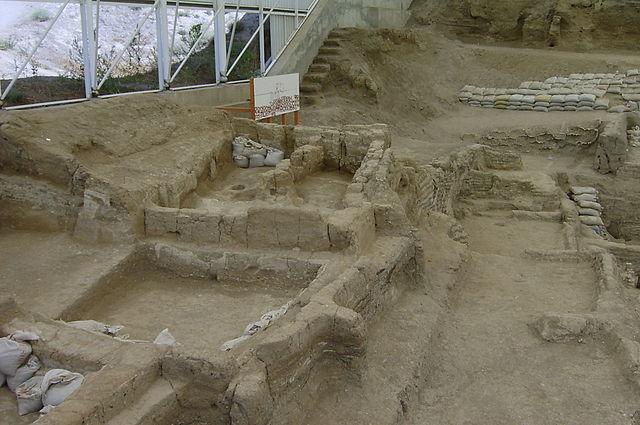1. Miéville uses a third-person voice throughout. It focuses tightly on McCulloch, the character whose perspective the whole story follows—except for the few paragraphs after the reveal, where Miéville offers about a page of info dump. My question is whether his voice is as tightly focused as Cherryh’s typical voice. My knee-jerk response is that the two voices are similar. But how?
—I’ll start with an example—Miéville’s description of the island’s central volcano: “The dead volcano sat sulking, hunch-shouldered.” Here, Miéville describes the mountain without describing the concept of mountain anew. He doesn’t begin at the start, talking about piles of stones, magma in the crust, the Pacific’s ring of fire, etc—he simply states it’s a volcanic island and it’s hunch-shouldered. I understand that it’s a shield volcano, but I’ve no idea which ocean it’s in. And I don’t need to because it doesn’t relate to the theme. Additionally, the description of the mountain shows how McCulloch views the thing—I bet that Soph or Will wouldn’t describe it as “sulking”. In this example, Miéville’s voice reminds me a lot of Cherryh’s. The whole story uses this voice, not just that one example. I’ll give one more example to drive the point home: after reading this story multiple times, I’ve little idea what McCulloch’s shop looks like, or his home. And I really don’t need to. The details he does give—McCulloch watches TV while at the counter, the whitewash is peeling, and the door-bell is on the fritz—show the slowness of McCulloch’s business and life, as well as his character and priorities: he can’t be bothered to fix the bell or whitewash, maybe because of the slowness, maybe because of apathy.
—What I like about this voice is pretty simply explained: it does four things for the reader that I appreciate in prose. First, it trusts the reader to figure things out, rather than spoon-feeding all the information. Spoon feeding often comes off insulting, while this voice seems like Miéville trusts his own writing and his readers. Second, it focuses on the theme rather than focusing on the context—which keeps the ideas, characters, and story moving and changing quickly. Third, it helps explain the characters through showing what they notice. For instance, when McCulloch enters the bar, which he’s been in many times before, he notices everything anew because he’s looking for Soph and Will. That helps show his mental state. Fourth, and this is most important, it allows me to fill in the blanks with my own imagination. Like the old adage “don’t show the monster”, this tightly focused, third-person voice trusts that the reader will fill descriptions in with details more effective to themselves than Miéville could ever dream up.
—At the same time, Miéville allows himself a paragraph or two here and there—or a lengthy section like the info dump after the reveal—to break with the voice and add a little context. For instance, on page five Miéville describes a little more of the nature of the culture, from a narrator’s point of view, rather than McCulloch’s. But he focuses it all on why this information is important to McCulloch, rather than leaving it out there as unimportant details. And that narrator's voice shows how his voice is different than Cherryh’s: where she allows extensive interior monologue, he frames his breaks with the voice of a narrator who consistently refers back to McCulloch. If you squint, you could say it’s summarized interior monologue. In that fifth page example, these thoughts are not being thought by McCulloch in the now, but these past thoughts and decisions are influencing his actions in the now—it seems unlikely that he is rehashing the history of the island since he moved there, all while sitting in the bar with Cheever. So Miéville summarizes McCulloch’s past thoughts, as a narrator, placing that information right there because it influences McCulloch’s next statements.
—So, there is a difference between Cherry and Miéville’s voices: it’s only the slightest difference, but it is one I noticed. But in conclusion, the answer is mostly yes: Miéville and Cherryh’s tightly-focused, third person narratives accomplish similar goals through similar tactics. And they are both effective for me. They are not exact copies of each other, but they’re closely related enough that I think of them in the same vein.
2. There is a deep care and consideration put into every word. I would call it poetic—not primarily in the sense of the whole sounding beautiful and following syllabic or stress patterns, but in the sense that every word matters.
—The example of the mountain's description shows how that word “sulking” is doing double duty: describing both the mountain and how McCulloch sees it. Even something as throwaway as Soph buying a bag of chips comes back in later, multiple times, and ends up being important to McCulloch getting into the dig site, to Gilroy accepting him there, and to his role in the later events. A third example is calling the unknown intelligences “collaborators”, which first occurs on the second page, twelve pages before the reveal. I have no context for it, no reason to think he means what it ends up meaning. So I assume that he’s talking about the culture the archaeologists are investigating, I assume he's implying they worked together more than other ancient cultures—and he is, but in a way that gives the word new meaning and importance after the reveal. Before the reveal I think it’s an egalitarian culture, a friendly one; after the reveal the friendliness with beings so other to us gives the word a new context that still perfectly describes what the world believes about these cultures. It’s a perfect word-choice, both before and after the reveal, both in the first read and in a reread. I am massively impressed by that one word. And this one word is a perfect example of the care given to every word within the story.
—But Miéville doesn’t ignore sounds. Rather, there are places within the story where sounds are important to the structure of the paragraphs.
Digs, development, and tourism were all controlled: the chamber of commerce constantly complained.All that consonance is an extreme example, but he also uses vowel sounds intentionally and to make the prose beautiful.
“How dare you, sir? I’m curious. Oh, for a sprinkling of the old Sodium Pentothol.” Cheevers mimed opening a compartment on his signet ring and pouring something into Paddick’s glass.In these two example, the prose’s beauty adds interest to the writing. And the story is better for it, for having this beauty. Not only is it yet another layer to dig into in this complex and beautifully crafted short story, but it also raises this prose well above the typical prose and shows how much hard work went into it.
—This level of care and consideration is a ton of hard work, and I appreciate it whenever I can find it. These are stunning combinations of words, taken as a whole, but he doesn’t let the beauty run away with the tale—it’s still efficient and tight prose that communicates effectively. Miéville shows brilliant balance, coming down on the side of efficiency, but not letting that stop him from writing beautifully. For contrast, Asimov is efficient and never beautiful. I vastly prefer Miéville.
3. To build the world through this voice and writing technique, Miéville often implies instead of stating directly. Like the example of the mountain’s description shows, he implies it’s a shield volcano rather than outright stating that the island was formed from a shield volcano. The old name of the bar, “Cunny Island”, implies that it used to be a brothel or strip club; and it also implies something about the culture of the island’s residents and tourists before the archaeology really took off—an implication which ties into every other part of the story. The season is implied as being a week past summer weather when McCulloch is said to have packed up the beach balls and towels and packed them into the store-room; as well as with the line, “The municipality had just switched over to the winter schedule and, for a few weeks, the streetlights would start to glow pointlessly early,” a line that also implies something about the lackidasical nature of the island, the lack of precision and pace of life. The line “Friendly business competitors” implies the nature of the community of the locals now, after the archaeology ramps up. Stating that the fisherman are coming up from the bay implies something about the economics of the island without telling a detailed account of the economy.
—There is some groundwork directly stated in the way the islanders tend to preserve rather than exploit, and this is on page five. But even that direct statement implies a cultural baggage that is important to the narrative and world-building.
—In short, the story implies rather than describes the world, but implications are even in the direct descriptions.
4. This method of worldbuilding is clearly secondary to Miéville building his theme, which rests in the relationships. The relationships are not restricted to being between two people: Miéville’s relationships also include corporate ones. You can look on the complex relationships here as a family tree, each level informing the two on either side of it. For instance: the locals to the archaeologists, the archaeologists to archaeology, everybody to the collaborators; each of these relationships are reinforced through the specifics of individual relationships involved—Paddick’s relationship with archaeology differs from Gilroy’s relationship with archaeology, which is different than the locals’. Through the lens of those three relationships, a corporate relationship is built.
—However, the story is about McCulloch and his relationships to his past, the island, and other people—but again, the relationships are always interconnected, and these three categories of relationship inform and build his relationship with himself. And here is the crux of the story. Miéville shows McCulloch growing increasingly integral to his world and the people around him—that’s the plot, McCulloch changing from a disaffected semi-loner to a person who is an integrated part of his society’s structure. At the start he’s not “Johnny come lately” because he’s an immigrant, it’s because he is so disaffected. At the height of the drama he’s helping people, he’s interested and invested, and this all appears to be new for him—at least since he moved to the island. He is sucked into the whole situation by circumstance, happenstance, perhaps fortune, and it affects him. He’s watching Soph unravel before his eyes, and he can’t handle it. She knows what she wants, and now she’s furious and denied. It hits too close to home for him. He is disturbed by how affected he is—especially after the fact, after he gets a chance to step back and look at it all from the outside again. While everything dies down a bit, he ignores the phone calls and stays home in order to try and recapture his disaffected habit. But at the end, when Soph walks into his shop, he caves to his curiosity and sociability and accepts the connection, realizes he needs it. From here, will he continue to cut himself off, or will he integrate? I don’t know, but Miéville leaves us on his relationship with Soph, therefore he seems to imply that McCulloch gets back to his life while accepting a new depth to his relationships, a new need for sociability. In other words, the whole situation finally illuminates to him how interconnected he already is on the island, and he finally accepts it, somewhat. Or at least has a chance to. But he probably wants it on his own terms.
—And that relationship with Soph is never explicitly one of attraction. I don’t get the sense that this is a potential romance. I get the sense that he connects with her because he is still somewhat of an outsider, she’s friendly to him first, she can satisfy his curiosity, and later because he can help her and he shares her disappointment at Paddick’s actions. They are comrades, not potential mates, throughout.
5. The dialogue is spectacular. It’s really Brian K Vaughan level stuff. Miéville rides that line between the fractured, day-to-day reality of conversations in half-sentences, and the unrealistic literary dialogue that must always make sense in the retelling. This balance is done well and I feel like McCulloch and Cheever are fairly well-spoken individuals, but not outside the normal bell curve.
—Miéville shows that he is deliberate about matching his characters’ words to their mental states. For instance, when McCulloch arrives in Banto he doesn’t know where to go. In this instance, I would be a little nervous—he’s already shown he doesn’t know that much about Banto or the people there, and his need to stop and ask directions could induce nervousness. He's outside his comfort zone, but he’s also an islander, not a tourist. So he affects a casual, “I heard there was a dig somewhere,” and this shows his mental state spectacularly.
—But the mental states are not all shown. Miéville also tells. An example would be in the scene where he guesses Sophia’s name as Sophie and she corrects him: Miéville writes simply, “He was embarrassed.” This telling line informs McCulloch’s next statements, showing him putting on bravado to cover his embarrassment.
—The dialogue fractures even more when the emotions run high, when Soph starts shouting at Paddick. This change in the length of sentences, mixed with the word choices, drives home the drama of the situation for McCulloch and the reader.
—Through all this, Miéville stays away from explaining everything between the dialogue. Instead of paragraphs describing McCulloch’s embarrassment, he simply writes, “He was embarrassed.” This is a sentence, not a paragraph. It contextualizes more than it explains.
6. That reveal halfway through stunned me the first time. It’s on page fourteen. The first half assumes the reader knows, then they suddenly do know. They don’t know everything, but they know. It is effective for two reasons: first, it makes a reread enjoyable. On rereading I finally noticed all the mentions of collaborators in the first half, and saw how integrated they were throughout. Second, the casual, foregone conclusion tone of the reveal reiterates the tone of the story. It reinforces the focus on McCulloch’s life, but contextualizes just how disaffected he is. He lives in this place where the collaborators are a daily reality, and he’s still this disaffected. The collaborators are amazing! They’re unprecedented! They’re fantastic! They change everything about Earth and humanity. But they’re already commonplace to the islanders, even to a new one like McCulloch. Sure, he goes to see the exhuming, but only because it’s a notable one. And even there, he's sort of nonchalant about the whole situation, especially compared to the excitement of the archaeologists.
—The collaborators are just another piece of this story, McCulloch’s story. They’re the most fantastic context, but they’re not the point, like they would be in many other speculative fiction short stories. The collaborators are subsumed beneath the relationships of the characters. Sure, the archaeology is central to the characters’ lives, but the story is the characters’ lives. That’s why the archaeology is in here—to help explain the characters—not the other way around.
—The question here is whether the reveal overwhelms the story or not. The danger is that the reveal is too fantastic, distracting too much from the focus of the story on mundane McCulloch. It didn’t affect me this way because even the reveal is as nonchalant as McCulloch—reinforcing the story’s thrust in the heart of the distraction. But I can see a reader being overwhelmed by it. On rereads the focus on McCulloch was driven home more than on the initial read—I was less astounded by the collaborators when rereading. But that comes with the knowledge of the reveal.
7. In all, this story is memorable to me, and I hope it’s influential as well. The reveal certainly took my breath away the first time, as a writing tactic more than for what the collaborators are. But the dialogue, the world-building, the character of McCulloch, and the voice astounded me more.







No comments:
Post a Comment